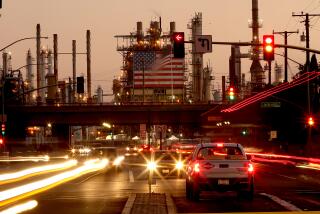Report Targets Defense Firms’ Cleanup Costs : Pollution: House panel says new rules are needed because Pentagon was reimbursing expenses without proper scrutiny.
- Share via
Lockheed Corp. and other defense contractors may recover $3 billion from taxpayers for environmental cleanup during the next decade, according to a new congressional report that calls for better oversight and new regulations to assure that “the American taxpayer is fully protected.”
The report, issued this week by the House Committee on Government Operations, said new rules are needed because the Pentagon in many cases has reimbursed contractor cleanup costs without investigating if the contractors were negligent or violated environmental laws.
Citing the planned sale of Lockheed’s Burbank properties for an estimated $200 million and the huge cost of soil and ground-water decontamination there, the report also urged a policy allowing the government to share proceeds from the sale of land cleaned up with the help of taxpayer funds.
The report contains the highest estimate to date of the cost of helping defense firms clean up scores of polluted production and waste-disposal sites. It is the latest chapter in a congressional inquiry that began two years ago after The Times disclosed that the Pentagon was becoming a key underwriter of hazardous waste cleanups without congressional scrutiny or public debate.
Building on previous studies by the General Accounting Office, the new report comes two weeks after approval of legislation requiring the Pentagon to track the amount of reimbursements to contractors for environmental cleanup and to make an annual report to Congress.
That request had been opposed by the Bush Administration, but was endorsed by Clinton appointee Sherri Wasserman Goodman, who holds the newly created post of deputy undersecretary of defense for environmental security.
Many of the country’s major defense contractors face huge environmental liabilities, with responsibility for dozens of Superfund toxic cleanup sites. Their ability to recover costs from the government has become a sore point with some members of Congress and environmentalists.
Critics say the situation undermines the basic thrust of the federal Superfund program, intended to make private polluters clean up their own messes.
But many contractors have been able to treat cleanups as routine business costs--like utility bills and office supplies--and recover a portion from the Pentagon. They have done so under contract regulations that, while not directly addressing environmental costs, allow reimbursement of “reasonable” business expenses.
Contractors typically allocate costs to government and private customers based on the proportion of sales made to each. Thus, the report says, of roughly $10 billion in cleanup expenses during the next 10 years, contractors could recover up to $3 billion from the U.S. government if present policies continue.
However, Lockheed and other firms whose main customer is the Defense Department stand to recoup a higher portion of their environmental costs.
In congressional hearings in May, Lockheed officials said the company faces about $385 million in cleanup costs nationwide--including at least $263 million in Burbank. Lockheed is attempting to get part of that amount from private insurers, but officials said the firm expects to recoup 50% to 70% of it from the government.
Lockheed has shifted production to Palmdale and Marietta, Ga., and is engaged in an extensive cleanup at its Burbank complex--both to meet environmental requirements and prepare the property for sale. The company is also heavily involved in the planned Superfund cleanup of chemically tainted ground water that has shut down municipal water wells in Burbank.
Lockheed last spring estimated the cost of the Burbank cleanups at $263 million, but price projections regularly have risen and probably will again.
Defense firms argue that all companies pass costs to customers--and that their customer just happens to be the government. Under the same principle, Lockheed officials say they expect to recover most of last year’s $33-million settlement with company employees who claimed injuries from exposure to toxic chemicals.
Although House Government Operations Chairman John Conyers Jr. (D-Mich.) had previously described the payment of cleanup costs as “secret bailouts,” the latest report lacks such fiery rhetoric.
Stung by criticism, however, Lockheed officials have mounted a counterattack. In a commentary in Lockheed Today, a company publication, Lockheed Chairman Dan Tellep said pollution by the company “did not result from any violation of law.”
“Unfortunately, there are some in Congress and in the news media who believe the principle of equitable cost recovery from customers should apply to everyone but defense contractors,” Tellep wrote.
But the new congressional report says Pentagon officials have too readily assumed that pollution caused by Lockheed and others did not violate environmental laws.
Because written cleanup agreements with environmental agencies usually include a disclaimer of wrongdoing by the polluter, cleanup costs are not treated as fines or penalties--which are not reimbursable--but as routine business expenses, which are.
This, the report says, has allowed “broad reimbursement” of cleanup expenses “without any comprehensive investigation of possible contractor wrongdoing.”
The report also says some contractors have been able to charge cleanup costs to fee-bearing accounts that provide them a profit on top of reimbursement.
Moreover, it says, reimbursement decisions have often been inconsistent. As an example, it said, defense auditors refused to pay certain cleanup costs of Aerojet General under a prime contract, but agreed to pay the company similar costs as a subcontractor to Martin-Marietta.
Pentagon officials last fall issued internal guidelines calling for reimbursement only when pollution occurred “despite the contractor’s compliance with the law.”
However, the new report calls for a comprehensive environmental cost regulation “that fully protects the interests of the American taxpayer.”
More to Read
Get the L.A. Times Politics newsletter
Deeply reported insights into legislation, politics and policy from Sacramento, Washington and beyond. In your inbox twice per week.
You may occasionally receive promotional content from the Los Angeles Times.










